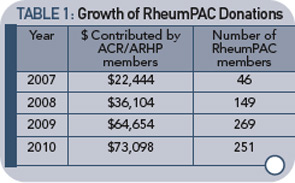
Thank you to those 251 ACR members who supported RheumPAC in 2010. What do RheumPAC donations get rheumatologists? Access. Even with only 3.5% of ACR members supporting RheumPAC, doors have been opened and the voice of rheumatology is being heard.
RheumPAC is the nonpartisan political action committee (PAC) for the ACR. Any organization that wants to have a seat at the table while policy is being made needs to have a PAC. It is an important part of the legislative process and physicians should take the time to be educated on this topic. Is the PAC system the best? Probably not. Regardless of your thoughts on PACs, they are a part of the political process. Members of Congress would like to be (re-)elected so they can continue to serve—and it takes money to run a successful campaign. We need to work with the current structure of the government. The ACR is not large enough to create major change in the government, so we can either play or sit idly by and watch change happen to us. We must engage in the process and access these lawmakers. RheumPAC yields access. People often have misconceptions about PACs and the political process, so I encourage each and every ACR member to take five minutes to read this.
What is RheumPAC?
In 2010, 91% of RheumPAC-supported candidates were elected (or re-elected) to the 112th Congress.
I am happy to announce that 2011 is RheumPAC’s fourth anniversary. RheumPAC was created in 2007 to enhance the ACR’s increasing advocacy efforts. It is a federal PAC that follows the Federal Elections Commission laws. Only U.S. ACR members can contribute to RheumPAC, and its administrative costs are paid by the ACR. One hundred percent of all contributions to RheumPAC support congressional candidates.
Access
What is RheumPAC really? What does it do for you? RheumPAC gets you access to key policymakers.
Each election cycle, the RheumPAC committee creates a list of members of Congress whom RheumPAC would like to support—they may be on key committees and/or support rheumatology issues. Typically, the member of Congress will host a fundraiser and a RheumPAC member will attend. The event provides RheumPAC with an opportunity to speak with the member of Congress in a small group setting. We have participated in 57 events over the past three years, including one for Rep. Fred Upton (R-MI). Here’s the e-mail an ACR member who attended the event sent to me afterwards:
I attended a small (four people) breakfast for Rep. Fred Upton. “Fred,” as he requested I call him, is a moderate Republican who honestly listens to his constituents. He was the lead Republican on the Arthritis Prevention Control and Cure Act. I attended this event and was able to remind Rep. Upton about the issues in healthcare reform that are directly affecting rheumatologists. These include a pediatric subspecialty loan repayment program—much like the provision in the Arthritis Act specifically addressing pediatric rheumatologists—to ease the financial burden for medical students interested in pediatric subspecialties. Additionally, I had the opportunity to further educate him on extreme cuts in DXA reimbursements. He verbally stated that he is supportive of both provisions. I encouraged him to talk to his Republican colleagues on the committee about the importance of these issues. As the Energy and Commerce Committee continues to work on the legislation, this was a great opportunity to have an hour of the congressman’s ear.
Attending the breakfast was beneficial to building a relationship with Rep. Upton and provided an opportunity to further educate him on rheumatology issues. The ACR continues to cultivate its relationship with the congressman. With the recent leadership change in the House, Rep. Upton is now the chairman of the House Energy and Commerce Committee, which has jurisdiction over many healthcare issues. As you can see, RheumPAC provides opportunities to develop relationships with Congress that will benefit the ACR.
How Does RheumPAC Decide Who Receives Contributions?
RheumPAC develops a slate of key congressional members who are prioritized based on demonstrated support of rheumatology-related issues through sponsorship, co-sponsorship, and letter writing as well as leadership positions. RheumPAC discusses and votes on contributions to each member of Congress and determines an event to personally deliver the contribution—an opportunity to discuss rheumatology issues. In 2010, 91% of RheumPAC-supported candidates were elected (or re-elected) to the 112th Congress.
I received this email from an ACR member who attended an event for Senate Finance Committee member Charles Schumer (D-NY).
I attended a fundraiser for Sen. Schumer. He spoke for 30 minutes and took questions. I asked a question and got in SGR and loan repayment. He remembered and addressed me by name and promised to have his senior staffer sit down with us. Lots of face time, at least 90 minutes, and I think it was productive. He is very supportive of our issues.
Again, access is the name of the game. RheumPAC provides the ACR opportunities to speak face to face with lawmakers who are developing policies affecting our profession and our patients. I have attended several of these events myself and have seen how valuable they are in advancing congressional knowledge of rheumatology. Does this solve all of our issues? Quite simply, no. RheumPAC is only one method to educate Congress on the value of rheumatology. The ACR continues to educate members on the importance of advocacy and brings members to Capitol Hill each September for Advocates for Arthritis. Additionally, the ACR is rolling out a major public relations campaign targeting Congress, President Obama’s administration, and other “key influencers” (I will be discussing that campaign in next month’s column).
Engaging in the political process is necessary for the ACR. Every aspect of your profession—from Medicare payments, to research dollars, to work force issues—is influenced by Congress. Supporting RheumPAC and all of the ACR’s lobbying and advocacy activities collectively provides rheumatology access on Capitol Hill.
I have contributed generously to RheumPAC since its inception and will contribute again this year. RheumPAC has the full support of the ACR Executive Committee and Board of Directors, and the ACR’s leadership recognizes RheumPAC’s important role in our efforts. RheumPAC is not about Republicans or Democrats, liberals or conservatives. RheumPAC is not about healthcare reform. RheumPAC simply provides us access and opportunities. From there, it is up to us to ensure that Congress understands and recognizes the value of the rheumatology subspecialty.
Dr. Borenstein is clinical professor of medicine in the division of rheumatology at George Washington University Medical Center, in Washington, D.C., and in private practice at Arthritis and Rheumatism Associates there. Contact him via e-mail at [email protected].

